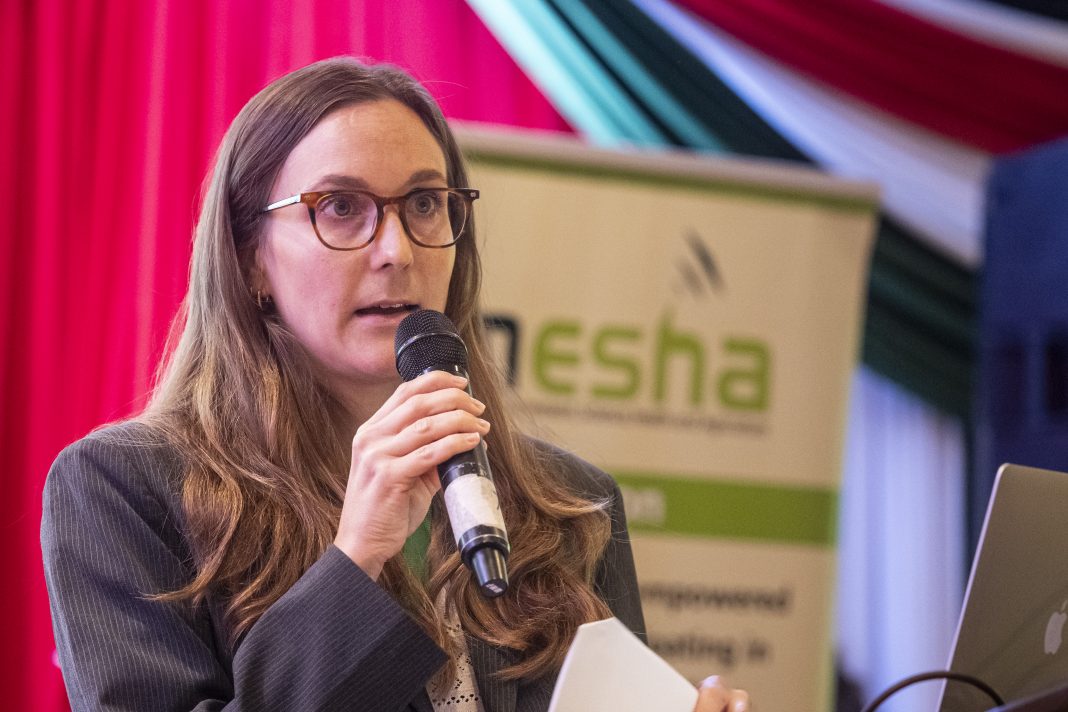By Milliam Murigi
For decades, CropLife International, an international association of agrochemical companies, has been best known as the global association representing manufacturers of chemical crop protection products.
However, as the agricultural landscape evolves and the demand for sustainable farming intensifies, the organization is now steering a transformative shift embracing biopesticides as part of a balanced, nature-friendly approach to crop protection.
“Even if we have been developing chemical pesticides for many years, we always advocate that chemicals should be used as a last solution, only when other pest management approaches have failed,” says Margaux Rundstadler, Director of Public Affairs and Communication at CropLife Africa Middle East.
She was speaking at the International Federation of Agricultural Journalists (IFAJ) 2025 Congress convened by Media for Environment, Science, Health and Agriculture (MESHA) in Nairobi, Kenya.
According to her, the organization is at the forefront of promoting research, development, and adoption of biopesticides across the continent. The reason is that these products, derived from naturally occurring materials such as plants, bacteria, fungi, and minerals, are increasingly being recognized as safer and more sustainable alternatives to synthetic pesticides.
When integrated with conventional pesticides, biopesticides synergistically enhance crop yields, extend application timings, and support effective resistance management strategies for farmers. They also contribute to reducing pesticide residues on crops, especially if applied closer to harvest, thereby improving consumer safety and supporting the growth of export opportunities for local farmers, ultimately boosting rural incomes. Additionally, they present reduced environmental risks while remaining relatively safe to applicators.
“Biopesticides (BioPPPs) agents are one of the solutions that can deliver various benefits when effectively integrated into Integrated Pest Management (IPM) programs. They help reduce dependence on chemical pesticides, support biodiversity, and sustain long-term soil health key pillars of modern sustainable agriculture,” Rundstadler adds.
According to her, today, the Africa–Middle East region stands at a crossroads. It must confront the growing threats to food security posed by climate change and the rising pressures from pests and diseases, while also meeting the demands of a rapidly expanding population.
At the same time, the region must enhance its competitiveness in the global export market by producing food with fewer residues to satisfy the growing demands of conscious global consumers. This complex challenge calls for innovative, science-driven solutions that safeguard both productivity and the environment, exactly the direction CropLife International is advancing.
This shift represents the organization’s commitment to supporting agricultural sustainability and biodiversity conservation while ensuring that farmers continue to have effective tools for managing pests and diseases.
“We are not only investing in the production of biopesticides but also supporting efforts to streamline regulatory processes so that farmers can benefit faster. Our goal is to promote a balanced toolbox that combines both conventional and biological solutions,” Rundstadler said.
The biopesticide market across Africa and the Middle East is witnessing steady growth as governments and regulatory agencies embrace IPM strategies that favor natural and environmentally friendly solutions.
In Kenya, for instance, registration of biopesticides has increased from 5 per cent to 10 per cent in 2025, a clear indicator of growing confidence in the sector. Similarly, in Morocco, the share of registered biopesticides rose from five to six percent in 2024, signaling the beginning of a broader regional transformation.
To fast-track this transition, CropLife International is collaborating with governments, research institutions, and private companies to build capacity and create an enabling regulatory environment. Rundstadler noted that regulatory bottlenecks remain one of the biggest hurdles to wider adoption, as registration processes for biological products are often lengthy and complex compared to conventional pesticides. Simplifying these procedures, she said, would accelerate innovation and ensure that farmers access safer solutions faster.
Beyond regulation, CropLife is also investing in farmer education to ensure that the adoption of biopesticides translates into real impact on the ground. Through its stewardship programs, the organization trains farmers on proper handling, storage, and integrated pest management practices. The goal is to build confidence among farmers that biopesticides can deliver reliable results while maintaining ecological balance.
“Ultimately, it’s about giving farmers’ choices,” Rundstadler explained. “They need tools that work for their specific environments, whether it’s a biological solution or a chemical one. What matters is using these tools responsibly to ensure food security, protect biodiversity, and sustain livelihoods.”







